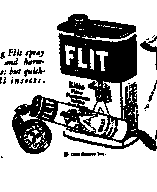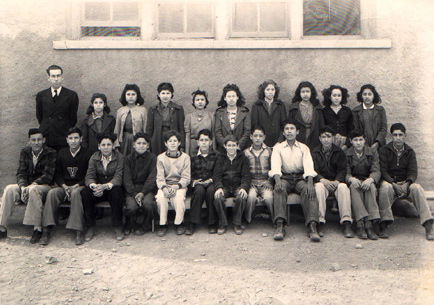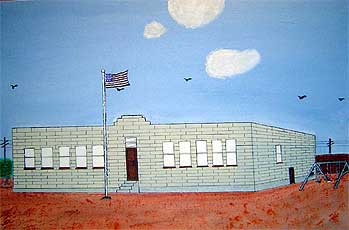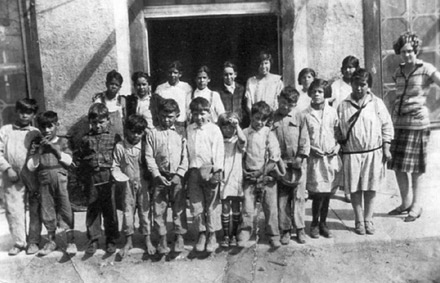South Ward Elementary Grammar School
Otherwise known as
The Mexican School
THE WAY IT USED TO BE---------------------------------LO MEJOR DE LO QUE FUE
The fourth of September of 1936 was just another day for many people all over the world. Not so for me. This was the day I was placed in an institution of learning which I later came to know as the Mexican school. The name itself is indicative of the kind of people for whom it was built. The real estate on which the school was located was right across the street from the biggest pig sty in west Texas. A black man by the name of Calvin owned the property, and he was the proud owner of approximately fifty enormous pigs, and we were treated to the snorts, squeals, grunts, and crass aroma emanating from these pens every single day we attended school.
I was a wimpish little mama's boy who became accustomed to hearing "mi hijito lindo," "que chulo mijito," "que precioso," so many times every day I finally came to believe it. I, therefore, would always make it a point to be close enough to mama so I could hear more about what a little darling I was. I never ventured more than a block away from home the first six years of my life. I knew nothing of the existence of buildings as big and majestic as the one into which I had just been thrust, and worse still, left there! It was as though I had been uprooted from my world and transplanted into an entirely new one. Luckily for me, I already knew about "La Llorona" and the "Cucuy." I also knew I was far away from the safety of my barrio, and further still from all the terms of endearment that I was so accustomed to hearing. "Ya es hombrecito mi hijito," mama would say. Yeah, right!
I came from a house with dirt floors, no inside privy, no running water, no electricity. I knew about outside toilets, about bringing in drinking water from outside faucets, and about quinqués (kerosene lamps). We were subjected to bathe twice a week, whether we needed it or not, in #2 tubs (tinas). Mom would use homemade soap, made right in our own backyard. Certainly we were just as clean as anyone else in town considering "the times." I don't recall ever being filthy, or just plain dirty for that matter, unless it was during canica (marble) times when we played no less than twelve hours a day non-stop. But during school time, even though we were poor, cleanliness prevailed.
In that imposing, spacious building I discovered inside toilets, electric lights, and above everything else, wooden floors. It took real effort on my part to learn to sit on that contraption called a commode. I was accustomed to squatting when doing my business in the outhouses. (Los escusados) I got caught squatting on the commode by one of my friends and he started laughing at me.
"¡Asi no, pendejo. Siéntate!"
Needless to say, before school was out that day, everybody knew I had been squatting on the commode.
There were advantages to this new place. If we were thirsty, there was no need to go outside to drink; drinking fountains were available inside! And if the weather was cold, this building had a boiler and radiator heaters. Why, I didn't even have to chop wood for the calentones (wood heaters). Absorbing all the new stuff I knew nothing about was an education in itself. I was later to be educated in another way. One of the teachers heard me commenting "Híjuela, que suave!" After a few swats in the rear end, I was informed that my mother tongue was not appreciated there.
The first year was a real struggle. I went about the business of trying to learn English among other things- mostly by copying. I do not recall much about my first years of school. I really don't remember any learning taking place, although something was definitely happening. My most memorable encounter with the learning of English came through music. I had never heard the sound of a piano, nor singing in English. I loved the sounds the piano made, so I quickly learned the words to the songs.
Among the most memorable moments that come to my mind are the music lessons and the songs I truly enjoyed singing. "Barcarole," "My Bonnie Lies Over the Ocean," O Susannah,", and so many more. I attribute most of my English learning up until then to these songs.
I remember the spelling lessons, and my feeble attempts at reading Spot. Of course, it took me the better part of a month to see Spot. I would listen to the kids read,
"See Spot,"
and I would turn and look for that little sucker, but could never see him. I did this many times, and finally I turned to the girl next to me and asked her,
"Oye,¿ Quién es Spot? Dónde está?"
She pointed at the little dog in the book and said,
"Aqui esta, tonto, es este perrito."
"Oh".
Finally I could "See Spot run." I memorized every word in that book. Like a sponge, I soaked up everything that was taught to me.
I soaked up not only what was taught, but what was sprayed on us as well. You see, our school had de-licing sessions about twice a month. By order of the local doctor, all the little Mexican students were to be sprayed with Flit. Flit was a powerful insecticide. It was used to kill flies, ants, mosquitos, spiders, and other harmful insects. Cotton diapers would be placed over two students' heads and thoroughly sprayed with the flit hand pumps.

The stuff would run down our backs, get into our eyes, into our mouths, and nothing was thought of it. The teachers did not complain, nor did the mothers. That's the way it was. I have often wondered how many students with whom I attended school developed cancer as a result of those little sessions.
There were other learning experiences that I recall. The corporal punishment administered by the teachers via sixteen inch long, half an inch thick boards. Not one, not two, but as many licks as they deemed necessary to get the message across.
When I started school, they had a low first, high first, a low second and high second, a low third, and a high third. By the time boys reached the fifth grade they were growing mustaches. I remember one incident where this one fifth grader was so big that he was able to take the board he was being spanked with away from the teacher, and he spanked the teacher. Of course he was sent home never to return, but it caused the school system to rethink their policies about high and low everything.
There were good moments, too, like the food they would feed us. I don't remember how many times a week they fed us, but they would serve us delicious soup with corn bread, as well as other nutritious foods. I remember the big, juicy apples and the oranges given to us almost every day. I guess when it comes right down to it, the bad experiences were offset by the good done for us. My little brain continued to store new experiences and new vocabulary. It was in the fifth grade that I underwent a complete transformation.
 |
Mr. Bartley, who later became my fifth grade teacher, came to town. It didn't take him long to discover that I was not the smartest person in the world. He must have felt sorry for me because at the end of the day he made me an offer I could not refuse. He reasoned that since my dad was the janitor, I could stay an hour every day after school for tutoring. I went for the idea immediately, because that meant I wouldn't have to help my dad clean the school. He tutored me for about two months; I will never forget the day when I finally "knew" that I knew how to learn. Had it not been for this dedicated teacher, I probably would have been one of the drop-outs of my time. What this man did was to elicit from me a desire for learning. This has lasted to this very day.
I had had one other teacher before Mr. Bartley's time whom I will never forget. He administered the second and last spanking I ever received in school. Our classroom was divided equally by fourth and fifth graders. There was one day in particular when our teacher was trying to teach us something, I don't recollect what, but I do remember his admonition,
"If just one of you fifth graders does not know the answer, the whole class will get a spanking."
Of course, as long as there are classes conducted, there will always be this one student who at that particular moment will be deeply engrossed in a daydream. When these warnings are pronounced, this kind of student will totally miss it. But for the rest of the class, this was a good motivator. We made sure every single soul knew the answer. I believe they refer to this as cooperative learning. But there was one little flaw in the information channel. We had forgotten about my uncle, who was prone to forget anyway. This uncle is a year and a half older than I. My uncle had a reason not to be listening.
See - The Rest of the Story
Somehow we forgot all about him, and as luck would have it, his seat was right in front of the teacher. The following morning as soon as the teacher called roll, he popped the question. Every single student in the room, fourth and fifth graders alike, raised his or her hand. We were eager to display for all the world to see that we were smart. All hands went up in unison- except one - my uncle's. The teacher's face got red as a beet.
"All the fifth graders stand up!" I didn't like the tone of his voice. "Go to the rear of the room and line up," he commanded.
We lined up, and in the presence of both classes each one of us walked up to the teacher's desk, stood right up against it, bent over and received ten solid swats. Yes, both girls and boys! When I walked back to my seat, I was ordered to "sit." I couldn't. I nursed a purple rear-end for a month. Do I remember what was being taught? NO! Do I remember the spanking? YES!
Fifth grade was the highest grade in the Mexican school, and the time came when my class had "passed" to sixth grade. This meant leaving the barrio and having to go to the Anglo side of town to an entirely different school. This created major problems for us hyphenated Americans. It didn't take long to realize that the little Anglo kids wanted nothing to do with us dirty little "Mezkins." They stacked piles of rocks right in front of the school, and when we got to within range, the stoning would begin. Some of our group would strike back, some wouldn't. What I especially remember is no teacher ever came to help.
Luckily for us, we had a county judge who lived across from the school who witnessed one such incident. He walked across the street and informed the school personnel if something should happen to us while in the process of attending school, they would be held accountable. That brought it to a halt. To this day, every time I sing Rock of Ages, I remember the age of the rocks. A momentary setback, perhaps, but this opened the doors.
Almost every day someone would get into a fight. It took the better half of the first semester for these altercations to stop. As we went about the business of learning, they found out we were not the threat they presumed us to be. However, other incidents occurred which constantly reminded us at least a few of them would have been happier had we not been there. I remember one such incident when an Anglo student was making his entrance into the building walking just behind my uncle. It was chilly outside and the doors were closed. My uncle reached for the door handle and made his way in. The student behind him immediately pulled out his handkerchief before touching the door handle to avoid my uncle's germs, I suppose.
The seventh through the twelfth grades had to be my best years in school. That's when I realized I was blessed with the ability to learn almost anything rapidly. However, oral reports presented a difficult challenge for me. I knew my limitations when it came to speaking English. I still referred to Superman as supper man, and pronounced madam as my dame. I would squirm, stutter, and totally make a fool of myself during my presentations in front of the class, and the students showed no mercy. Their laughing made me want to die. How many times I wished I could have disappeared. This served only to make me try harder, so it was really a blessing in disguise. I managed to maintain a high enough grade point average to be next to the top. Thanks to the teachers, the subject matter was easy for me to learn. By now my mind was finally Anglicized enough that I could compete on equal footing with the rest of the class. I became aware most of my dreams would now be in English.
First period study hall was in the library. I now had access to all the books, and through the magic of reading could travel anywhere in the world. I began learning about different cultures and about myself. What I was reading and learning made me almost ashamed to be a Mexican-American. Almost every book had history written from the Anglo perspective, and everything I read about my people was negative. But I began to understand life is a series of doors behind which lies information available to any person desiring to find the keys to open them. However, one must exert the effort to make this information accessible. Unfortunately, some of the keys can only be obtained if one has money. This keeps some very able and capable people behind the doors. In those days the wherewithal was there, but the money was not. Information which should have been readily available withheld because of economics. Knowledge - a gift from God - should be shared freely.
Sports had a great deal to do with my formation. I was involved in football, basketball, and track. Even though I was not an outstanding athlete, I was good enough to be the quarterback of my team for a while. The rest of the time I played the half-back position. In those days coaches did not call plays. We had to learn to read defenses and play the game accordingly. The changes and adjustments were done at half time, otherwise we played the game we had been taught during the week. That's the way life is. I also won first place in typing, pole vault, and the mile run. I think this was because I was trying to prove to those people who laughed at my English that I could do something right.
I don't recall having had married teachers, male or female, during my first six years of school. Teachers waited longer to marry, probably because of salaries in those days. (The annual salary was $1,227.00) Not the best paid professionals of their time (Is this true in our time?. But one thing I know for certain; they were a dedicated lot. I think I could say the same about some of the students of that time. Rain, shine, or snow, the Mexican-American walked to school. There was not a single family that owned any kind of a vehicle. Maybe a couple of kids had bikes, but the rest of us walked. We too were a dedicated lot.
There is a concrete platform one fourth the size of a football field cattycorner from the Catholic Church the people used for community and school functions. Once a year the elementary kids would borrow the place from the church and we would do our singing and dancing presentations to the community. We were made to dress in white shirts, white pants, and yes, even white shoes. We looked like little angels. And why not? We were going to dance the May-pole dance. We had practiced enough to perform like professionals in front of the community, and that we did! We tried our best to make our teachers proud of us. And somehow I now know they were. We methodically weaved in and out in sync with the music, deftly holding our streamers where they would not become entangled, until all those streamers were completely wound around the pole. Once the ritual was over, I could almost hear myself saying, "Tenga!" There is no English equivalent to that expression of satisfaction, lest it be "There!"
This is probably what I will say at the end of my journey through life. I will look back at all the streamers (students) that the Lord has placed in my care while dancing the dance of life, and as the weaving reaches its conclusion I will look back and proudly say, "Tenga!" Then I shall proudly go join my Faithful Amigo in that great classroom in the sky, where incidentally, "Se habla español!"
For those of you who are wondering, ¿Quién son esos? Well, I'm going to throw some names at you. If you detect errors on my part, kindly email me and let me know.
Top Row:
Teacher Cummings, Leonides Abreo, Manuel Morales, Rogación (Roga) Martínez, Juanita Deanda, Priscilla Morales, Lupe Calderón, and Victoria (Toya) Abreo, Teacher McMillan
Second Row:
Consuelo (Lito) Barranday, Jesusita Bustamante, Jesusita Montoya, Ángela Morales, Belen Fierro, María Martínez, Socorro Luján, unknown
Third Row:
Ramón (Ruco) Montoya, Valentín Montoya, Candelario Fierro, Alfredo Talavera, Marcelino Martínez, and Moises Morales on the end.
Fourth Row:
Sabino Talavera, Jesús Barranday, Lalo Luján, Espiridión Méndez, Chito Luján,
unknown.
Can you identify the rest? Please let me know.
I had a very nice visit with Epigmenio Caraveo during Spring break. My only regret is not having had a video camera. I heard and saw stuff that is hard to believe. He allowed me to copy his 1927 school picture taken at the Mexican school. Not only did he let me copy the picture, he furnished the names as well!
Bottom row - left to right
Mele Esparza, Reyes Benavidez, Joe Milam, Epigmenio Caraveo, Lorenzo DeAnda, Valentín Montoya, Fifa DeAnda, Ramón Montoya, Pipi DeAnda, and Teresa Navarette.
Right to left
Teacher, Miss Nichols, Unknown, Lupe Benavidez, Juana DeAnda, Cecilio Villalobos, Juan DeAnda, Cristobal DeAnda, Ponce Villalobos, Sopaipa (real name not known)
And finally, a 1940 third grade class. The names to these students will have to wait until we can ascertain their names.
Front row - left to right
Juan Quintana, Luis Hernandez, no name, no name, Chito Ortega Aurelio Romero, Pete Sandoval, Monico Benavidez, no name, Sabino Martinez, Yldefonso Luna, Sabas Fierro, Carlos Gomez, no name, Pelon Abreo, Enrique Perez
Back row - left to right
Memis Jaquez, Virginia Ortega, Lila Fierro, Carmen Lujan, Chavela Calderón, Licha Herrera, Carmen Ortega, Miss Burnham (teacher) Aida Talavera, Lorena Carrasco, Nacha Escajeda, no name, Celia Quintana, Anna Carrasco, no name, no name, no name, Elena Talavera
Should you know any of the unknown faces, kindly email me at hluna@telstar1.com
This will surely be appreciated.
@Copyright 1998











